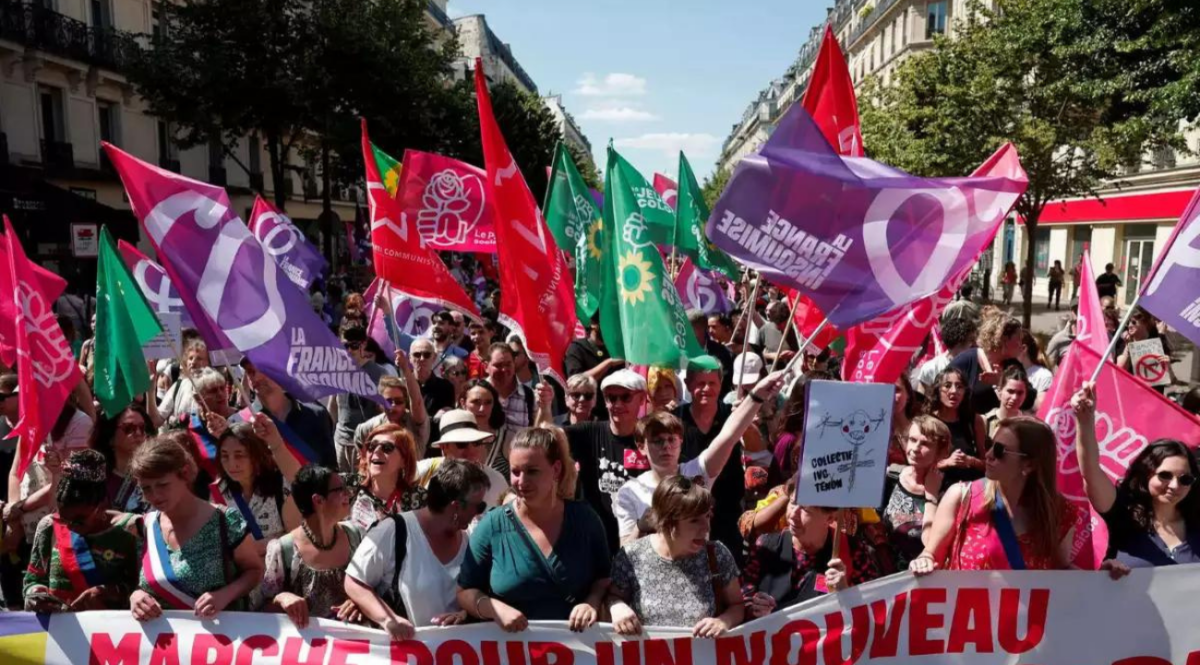Table of Contents
A Nationwide Outcry for Women’s Rights
France: On Sunday, cities across France witnessed thousands of women taking to the streets to protest against Marine Le Pen’s far-right National Rally (RN). The demonstrations, organized by around 200 women’s rights groups and unions, reflected growing concerns over the potential impact of a far-right government on women’s rights. With parliamentary elections on the horizon, the protests underscored a significant moment of political and social tension.
Mobilization Across French Cities
In Paris alone, more than 10,000 women demonstrated peacefully, according to organizers. Similar protests were held in numerous other cities, highlighting a widespread sentiment that women’s rights are at risk under far-right leadership. The protesters voiced fears that the RN’s policies could reverse gains made in gender equality and women’s autonomy.
The movement was a response to recent political developments, including the inclusion of the right to abortion in France’s constitution, a historic milestone. However, opposition from some RN lawmakers during the legislative debates raised alarms among the public. Shirley Wirden, who oversees women’s rights for the French Communist Party, noted the discomfort displayed by far-right deputies during these discussions. They were calling for a focus on increasing the birth rate among French citizens, which many saw as an indication of their broader ideological stance.
The Political Landscape
As France approaches its parliamentary elections on June 30, the RN appears poised to perform strongly, according to recent polls. An Ipsos survey conducted for Le Parisien newspaper and Radio France on June 19-20 projected the RN and its allies securing 35.5% of the vote in the first round. The left-wing New Popular Front (NPF) alliance was predicted to follow with 29.5%, while President Emmanuel Macron’s centrist alliance was expected to come in third with 19.5% of the vote.
This political context has intensified the sense of urgency among women’s rights advocates. Macron had called for a snap parliamentary election after the RN’s significant victory in the European Union elections, where they garnered around 32% of the vote, outperforming Macron’s centrist alliance, which received 15%. Notably, the RN saw a substantial increase in support from female voters, securing 30% of their votes, a 10-point rise from the 2019 EU elections.
Concerns Over Women’s Rights
The protests were not only a reaction to the RN’s electoral prospects but also a broader statement about the potential consequences of far-right governance. The organizers emphasized that women’s rights are often the first to be compromised when far-right parties gain power. This includes not only reproductive rights but also broader issues of gender equality, workplace rights, and protection against violence.
The inclusion of the right to abortion in the French constitution was celebrated as a progressive step, but the RN’s opposition highlighted ongoing ideological battles. Protesters expressed fears that a far-right government could undermine such achievements, turning back the clock on decades of progress.
A Call to Action
The demonstrations served as a powerful call to action for voters and policymakers alike. By mobilizing in such significant numbers, the women of France sent a clear message about their priorities and concerns. The protests highlighted the intersection of gender and politics, underscoring the need for vigilance and advocacy in the face of rising far-right influence.
In the run-up to the elections, these protests may influence public opinion and voter turnout, particularly among those who prioritize gender equality and women’s rights. As France stands at a crossroads, the actions of these demonstrators reflect a broader struggle for social justice and human rights, with implications that extend far beyond the immediate political contest.
The collective voice of the women who marched on Sunday represents a critical force in the ongoing debate about the future direction of French society. Their call for safeguarding women’s rights in the face of political shifts resonates as a reminder of the enduring importance of equality and justice in democratic governance.



